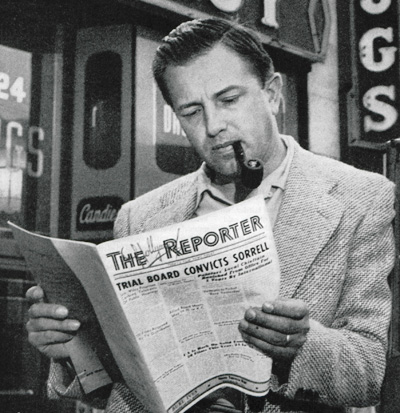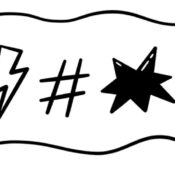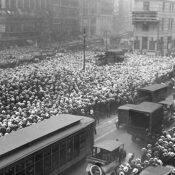October 20, 1947: Congress challenges Hollywood’s loyalty, and an American Communist makes a discovery.
This all happened back in the days when there were real Communists—not today’s “communists” who want health care reform, but true, card-carrying, loyal-to-Moscow Communists.
In 1947 it became clear that our ally against Nazi Germany had picked up its old habits. Russia was back in the business of overthrowing governments and supporting global revolution. A number of Americans were already acting as agents for the Soviets. One group had stolen plans for our atomic bomb and delivered it to the Russians.
America saw the countries of Europe fall under communist sway that year. It knew that it faced domestic threats, but not who was involved, or who could be trusted. As a result, the response was often overblown. For example, the infiltration of Communists into one labor union brought all unions under suspicion.
In this year, the House Committee on Un-American Activities began a broad investigation of domestic subversion and propaganda. Its first big target? Hollywood. A natural target, Hollywood was the nation’s cultural capital. If subversion and propaganda existed, it would most likely surface within the motion-picture industry.
Another reason for choosing Hollywood was all the Communists who worked there. Communism become fashionable among actors and directors, particularly during the Depression. It attracted idealists who thought communism could make America a better country. It appealed to radicals who supported subversion of any complexion. And it seemed nigh irresistible to eccentrics and contrarians who enjoyed associating with this dangerous ideology, even after the Soviets showed their true nature in the their bloody purges of the 1930s.
The House Committee began its investigation of communism by issuing subpoenas to several writers and directors, and asked “Are you now, or have you ever been, a member of the Communist Party?” They were ordered to reveal everything they knew about communist tendencies in their co-workers.
Ten of these witnesses defied the Committee and refused to answer its questions. They were defending their First-Amendment rights of free speech and association, they said. They were also hoping to save themselves because they were, or had been Communists, and knew that public admission of this fact would end their careers. They had broken no law by being a member of, or sympathizer with, the Communist Party. But communism was now loosely defined and fully criminalized by public opinion. The Ten knew that the studios, bowing to public pressure, would fire them if the fact came out in public. Nor could they be certain the government wouldn’t prosecute them.
For their refusal to cooperate, all Ten were cited for contempt of Congress. Most served time in prison. All were effectively banned from working in the movies.
In 1961 one of the Hollywood Ten, Ring Lardner Jr., wrote an article for the Post on his banishment from the film industry. Lardner says little about communism, or his involvement in it. Instead, he focused on the principle of free speech. He quoted a Supreme Court decision of 1943 that affirmed, “If there is any fixed star in our constitutional constellation, it is that no official, high or petty, can prescribe what shall be orthodox in politics, nationalism, religion or other matters of opinion, or force citizens to confess by word or act their faith therein.”
Lardner thought it was his duty to oppose the Committee and its ulterior purpose.
“Forced confessions, or disavowals, were what the committee was clearly demanding, and I felt it was an abuse of the legislative function that needed challenging.” Unfortunately the only legal way to challenge it involved the risk of losing the argument.
“It was clear beyond misunderstanding that there was no proper penance for past political misconduct except the naming of names: big names, little names, token names, names the Committee already had. It was a ritual, but not a meaningless one. To the un-ordained confessors in Washington and Hollywood, it was an act of perfect contrition.”
Looking back 15 years later, the conflict didn’t appear to Lardner as one of communism versus freedom, but his right of free speech versus the political opportunism of the Committee members. The certainty he felt must have been some comfort to him. Unfortunately, it was no comfort to Edward Dmytryk, another of the Hollywood Ten. When the Post interviewed him in 1951, shortly after his release from prison, Dmytryk had been shaken by his second thoughts.
“I was a communist,” he said. “I joined in the spring of 1944 and dropped out of the party late the next fall. And I never broke completely with them until I was in jail. Though I was no longer a party member, I stood with the Ten on my own personal convictions about civil liberties. And when we lost, I couldn’t say anything until after I had served my time. I wouldn’t have wanted it to appear that I was trying to escape any consequences of my original stand.
“I was carried along by a tide—a lot of good people felt that the hearings had been aimed more at blacklisting all Leftists in pictures than at investigating party membership. But they didn’t know what they were backing. I learned more about communism in the three and a half years I was one of the Ten than I ever learned when I was actually a party member. And it’s no good.”
For Dmytryk, there was no distinction between cocktail-party communism and the espionage of Russia’s agents. “No matter how small a fraction of the Party is guilty of espionage, the responsibility is on the whole Party, and anyone who supports it.
“I know it doesn’t add up,” he said slowly, “but everybody goes into communism seeking different things. I thought this was the best country in the world, but that we could still do better. I know it sounds unrealistic—and is—but I was trying to help people as I had been helped. And you just can’t do it alone, or through charity either. I know how I felt about charity myself. So you decide things have to be done on a scientific basis, so that people are really taken care of all the time. So then you begin hearing about systems. With me it was Marxism.”
Dmytryk realized that the Communist Party had little use for him, and his principles. His only value was how the party could use him for anti-American propaganda.
“The hardest thing I had to live with was the realization that they were trying to protect communism in this country by invoking the Constitution and civil liberties, things that wouldn’t last five minutes if the commies ever took over…This was on my conscience constantly.”
Shortly after this interview appeared, Dmytryk returned to Washington and offered the Committee what he knew about the Party’s work in Hollywood.
The Committee on Un-American activities never found evidence of propaganda in American movies. Throughout the war years, and into the 1950s, the movies remained overwhelmingly pro-American and anticommunist, not out of patriotism, but because such messages were economically profitable. The movie studios have remained faithful to democratic ideals because that’s what moviegoers wanted.
Click here to read “What Makes a Hollywood Communist?” (PDF).
Become a Saturday Evening Post member and enjoy unlimited access. Subscribe now




Comments
Today’s communists are far more than health care supporters. They are in fact working to carry out the same plan they always have, the fundamental destruction (transformation) of the American System. Their goals have not changed, only their methods have.
William Ayers, who kicked off Obama’s political career, was a member of the communist Weather Underground, a group known for its violence and its determination to kill as many Americans as necessary to achieve Communist rule.
The Communist Party USA worked hard to put Obama in office.
Obama is using his power to help Communist/Islamist alliances overthrow various Middle East nations. Obama personally traveled to Kenya to stump for the Marxist thug, Raila Odinga, in 2006. When Odinga lost the election, his marxist thugs did the usual, went on a killing spree.
Obama uses his power to kill American energy production while inviting Brazil to move in and drill off the coast of Louisiana. He uses his power to redistribute our wealth into the pockets of corporate crooks who serve The Party, proclaiming them “too big to fail”.
Today’s Leftists are little different from those of the ’40s. The key difference is that Communists are no longer based in the Union of Soviet Socialist Republics. They’ve gone globalist. Mikhail Gorbachev left the USSR in ruins and established Green Cross International to orchestrate global wealth redistribution through carbon taxation and regulation. Obama is merely a minion of the Communist masterminds, just as those in Hollywood were so many decades ago.
Give them credit. The Communists have taken power over America without Americans noticing. Key to that was taking over Hollywood, the news media, the education system, all the things Stalin said were necessary to control a society. That’s how they ensure they are not publicly exposed.
There was a time when Americans wisely took direct action to prevent enemies of the United States from taking jobs that would give them the power to fundamentally transform the United States.
Now, Americans have forgotten and the Communists have won the Cold War.
They put their guy in the White House.
Think About It
Can you e mail me a story about his dog Bean by Tait Trussell? Thankyou